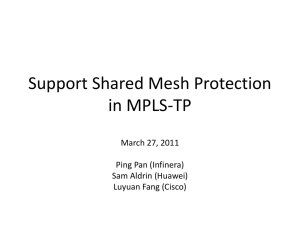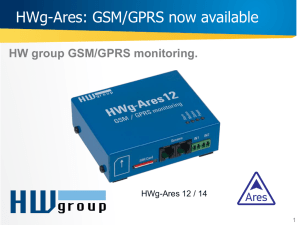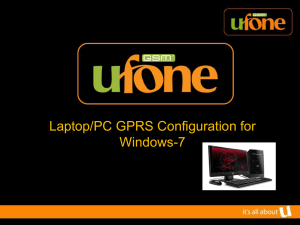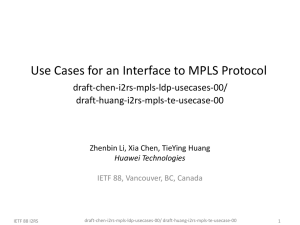I2RS Requirements
advertisement
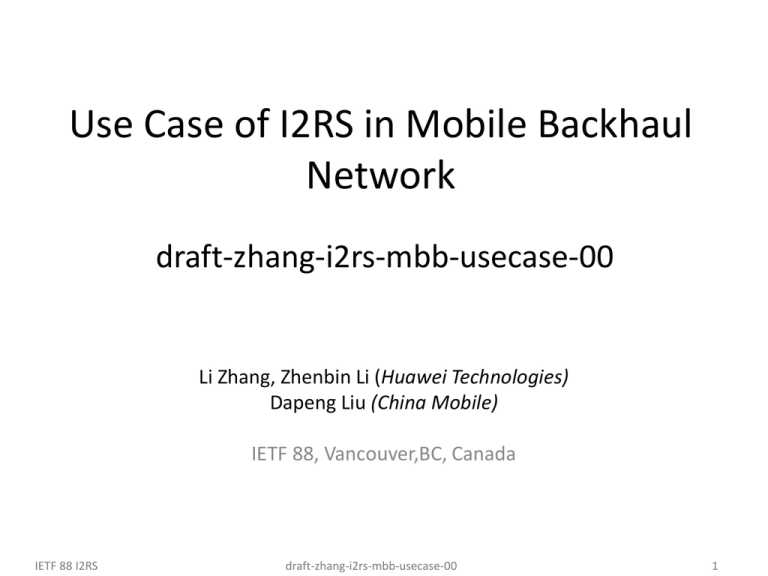
Use Case of I2RS in Mobile Backhaul Network draft-zhang-i2rs-mbb-usecase-00 Li Zhang, Zhenbin Li (Huawei Technologies) Dapeng Liu (China Mobile) IETF 88, Vancouver,BC, Canada IETF 88 I2RS draft-zhang-i2rs-mbb-usecase-00 1 Service Requirements for MBB Configuration Last Mile Access Aggregation RNC/SGW/MME CSG ATN BTS CSG E1 BSC RSG AGG ATN CSG ATM ATN PE NodeB Eth. CSG NodeB / eNB P PE AGG RSG STM-1 ATM RNC CSG ATN ATN TDM/ATM Application 2G TDM PW IP RNC/S-GW/MME E2E PWE3 Multi-segment PWE3 HVPN E2E L3VPN Protection mechanism 3G ATM PW 3G ETH VRF Route Policy Network Monitoring LTE VRF S1 LTE VRF X2 Ethernet Application Seamless MPLS MPLS LDP MPLS TE MPLS TP Multiple Applications across 2G to LTE, various network architectures, different service carriers make MBB configuration more arduous Traditional configuration and diagnoses mechanisms base on device-level management tools and manual processing are illsuited to meet the requirements of today‘s scalable, flexible, and complex mobile backhaul network. IETF 88 I2RS draft-zhang-i2rs-mbb-usecase-00 2 Usecase1: Application configuration Challenges various radio access modes: TDM/ATM-based and IP-based across 2G to 5G various radio applications: OM, voice, data, video with different SLAs various network architectures: multiple IGP areas and AS Flexible Configuration where the T-LDP should be configured, where the BGP peer should be established, where the VPN instance should be deployed, and where the BGP LSP should be set up I2RS Requirements Store a global mobile backhaul network solution provisioning information in a central location Distribute MBB configuration from the central location automatically IETF 88 I2RS draft-zhang-i2rs-mbb-usecase-00 3 Usecase2: Route Policy Enforcement Route policy focus on: Avoiding route advertisement across entire network supporting best route selection for VPN FRR or ECMP allowing On-demand route advertisement Dynamic enforcement Different network devices has individual route policy details in a networkwide route policy I2RS requirements: Use common APIs to collect network information dynamically Push route policy centralized and automatically IETF 88 I2RS draft-zhang-i2rs-mbb-usecase-00 4 Usecase3: Service Tunnel Implementation Service tunnel types: MPLS LDP LSP: DU, DoD, Longest length match, policy for LSP control MPLS-TE LSP: multiple path control attributes and multiple protection modes MPLS-TP LSP: multiple LSP types, static LSP is need in MBB Hierarchical deployment service tunnel implementation is not constant and unique across access/aggregate/core network in MBB kinds of LSPs could be used separately or simultaneously in the whole MBB I2RS requirements: Acquire the ability of network devices automatically Get the requirements of services on control plane to calculate and set up the LSP centrally. IETF 88 I2RS draft-zhang-i2rs-mbb-usecase-00 5 Usecase4: Protection Mechanism Hierarchical Protection Mechanism : tunnel protection : LDP FRR (LFA, Remote-LFA, MRT, e.g.), MPLS-TE LSP HSB and TE FRR, MPLS-TP LSP Line or ring protection service protection : dual-homing attachment is suitable with PW Redundancy and VPN FRR or VPN ECMP Flexible design Selection of service and tunnel, as well as the protection mode I2RS requirements: Get the whole information about tunnel and service Control and manage protection design centrally IETF 88 I2RS draft-zhang-i2rs-mbb-usecase-00 6 Usecase5: Network Monitoring Multiple monitoring tools: Tools: Different monitoring tools for different monitoring objects, such as NQA, MPLS-TP OAM, IPFPM Traffic path: get exact traffic path is useful for point-to-point detection Accurate deployment Deploy appropriate monitoring tools and accurate detection I2RS requirements: Get and store the entire topology and routing information centralized Calculate and store the traffic path naturally Deploy accurate network monitoring tools automatically IETF 88 I2RS draft-zhang-i2rs-mbb-usecase-00 7 Next Steps • Solicit comments and feedback • Revise the draft IETF 88 I2RS draft-zhang-i2rs-mbb-usecase-00 8


